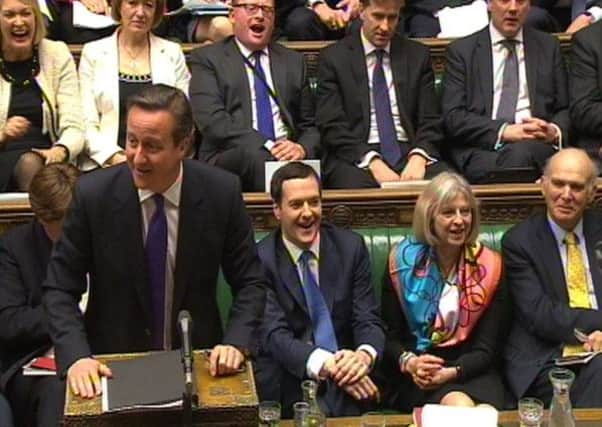Tom Richmond: Questionable ritual of an out-of-touch political elite


After the standard question about the Tory leader’s engagements and the now very familiar response about “meetings with ministerial colleagues... and further such meetings later today”, a backbencher will be asked to begin proceedings.
If it is a Tory, it is very likely that the question will pertain to the economy – and Labour’s lack of economic credibility. If it is an Opposition MP they’re likely to ask about the National Health Service because this is regarded as the Government’s Achilles heel.
Advertisement
Hide AdAdvertisement
Hide AdThe gladitorial-like atmosphere is not helped by the layout of the House of Commons that seems to encourage vitriolic exchanges – watch George Osborne and Ed Balls point and sneer at each other during today’s session.
After this, the Commons will then be drowned out by cheers – and jeers – as John Bercow, the Speaker, calls Labour’s Ed Miliband to his feet to ask the six questions that he is entitled to ask Mr Cameron as Leader of the Opposition.
Regardless of the subject matter, they will follow a predictable pattern. Mr Miliband will ask a question and the PM will ignore it and reply to an unspecified point that helps to portray the Doncaster North MP in a poor light.
There will be a brief appeal for calm from the Speaker, the Mr Pompous of politics, before Mr Miliband accuses the Prime Minister of presiding over a decline in living standards and Mr Cameron accuses his opposite number of not being fit to govern.
Advertisement
Hide AdAdvertisement
Hide AdThere will then follow 20 minutes of questions from backbenchers when the unhealthy influence of the party whips will be self-apparent – Tories will be tempted by the tantalising prospect of future promotion to ask questions on the economic recovery while Labour will use similar carrots to persuade its members to focus on the NHS.
Only those who have been passed over for promotion, or the very few independent-minded MPs that still exist, will ask, if called, a question that contains any element of relevance or originality.
And so it will go on, the exchanges becoming even more acrimonious as the 2015 general election dawns and the Tories and Labour struggle to neutralise the threat posed by Ukip and the Scottish Nationalists respectively.
Why does this matter? Unlike American presidents like Barack Obama who do not have to face such inquisitions, it should be to Britain’s credit that all prime ministers have faced – even endured – a weekly questioning in the House of Commons since such proceedings were formalised in 1953 during Winston Churchill’s second term.
Advertisement
Hide AdAdvertisement
Hide AdEven when the twice-weekly interrogations were replaced by one 30-minute session after Tony Blair came to power in 1997, PMQs still have the ability to make and break reputations. While the aforementioned Blair was more than a match for William Hague’s wit, Gordon Brown was never at ease at the despatch box and Nick Clegg’s predecessor Sir Menzies Campbell struggled to win the House’s respect.
Yet most voters did not even notice the ritual’s absence last week when Parliament enjoyed a three-day November recess.
At a time when the country is demanding straight answers to straight questions – such as the concessions that Mr Cameron intends to seek from the European Union or the failure of GPs to provide adequate out-of-hours cover – those who operate in the pernicious “Westminster bubble” are becoming even more inward-looking.
To politicians, the exchange at PMQs simply determine the mood at lunchtime while the London-focused political commentariat, and in particular the BBC’s Nick Robinson and Andrew Neil on The Daily Politics, appear pre-occupied with the personalities rather than the actual policies and their impact on people outside the perimeter of the M25.
Advertisement
Hide AdAdvertisement
Hide AdUntil this mindset changes, I’m afraid PMQs will continue to represent everything that is wrong with British politics – the substitution of serious debate with the type of name-calling which would not be tolerated in a primary school classroom.
What I would do? I would like the Speaker to favour those who show a willingness to raise issues in a constructive rather than a partisan way; I would like backbenchers to be given the right to answer follow-up questions so local issues can have a greater airing and I’d like to see PMQs extended by half an hour. This would enable MPs from a region such as Yorkshire, to raise questions on matters exclusive to their area. As it would be unfair to expect any Prime Minister to have all the answers, the PM could ask, for example, the Transport Secretary to respond to matters relating, for example, to local rail services.
It may work – it may not – but at least it is one possible answer to the question of making Parliament, and PMQs, less pernicious at a time when the public are looking for responsible leadership.
Bernard Ingham is away.